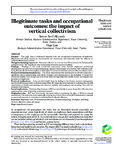| dc.contributor.author | Akyurek, S.S. | |
| dc.contributor.author | Can, O. | |
| dc.date.accessioned | 2022-04-25T12:02:07Z | |
| dc.date.available | 2022-04-25T12:02:07Z | |
| dc.date.issued | 2021 | |
| dc.identifier.issn | 20493983 | |
| dc.identifier.uri | https://dspace.yasar.edu.tr/xmlui/handle/20.500.12742/18590 | |
| dc.description.abstract | Purpose: This study aims to understand essential work and occupational consequences of employees’ illegitimate task (ILT) experiences (unreasonable and unnecessary task demands) under the influence of vertical collectivist (VC) values. Design/methodology/approach: Data were collected via a survey from 503 teachers in the Turkish public education sector. The hypotheses were tested using structural equation modeling. Findings: Findings of this study reveal that unnecessary tasks decrease employees’ professional identification and perceived occupational prestige, whereas unreasonable tasks weaken their workplace well-being. Results also show that employees with higher VC orientation feel these adverse effects to a lesser extent. Research limitations/implications: This study demonstrates that individual-level cultural values play a significant role in understanding task-related dynamics and consequences at the workplace. It brings new theoretical insights to job design and work stress literature regarding what similar factors can mitigate task pressures on employees. Practical implications: A key practical insight from the findings is that human resources management experts should create a positive task environment where ILT demands are not welcome by analyzing jobs and skill requirements in detail, communicating task decisions regularly with employees and providing them with the necessary work support. Social implications: Understanding the impact of ILT can greatly help to assess the quality of the education system and the value of teaching occupation in society. Originality/value: ILT have been mainly discussed without considering the effect of different cultural orientations. This is the first study empirically showing the diverse effects of two ILT dimensions on essential occupational outcomes in connection to individual-level cultural influences. | en_US |
| dc.language.iso | English | en_US |
| dc.publisher | Emerald | en_US |
| dc.rights | info:eu-repo/semantics/openAccess | en_US |
| dc.rights | Attribution-NonCommercial-NoDerivs 3.0 United States | * |
| dc.rights.uri | http://creativecommons.org/licenses/by-nc-nd/3.0/us/ | * |
| dc.subject | Illegitimate tasks | en_US |
| dc.subject | Job design | en_US |
| dc.subject | Occupational prestige | en_US |
| dc.title | Illegitimate tasks and occupational outcomes: the impact of vertical collectivism | en_US |
| dc.type | Article | en_US |
| dc.relation.journal | Evidence-based HRM | en_US |
| dc.identifier.doi | 10.1108/EBHRM-02-2021-0025 | en_US |
| dc.contributor.department | Business Administration Department | en_US |
| dc.identifier.wos | https://www.webofscience.com/wos/woscc/full-record/WOS:000724197500001 | en_US |
| dc.identifier.scopus | https://www.scopus.com/record/display.uri?eid=2-s2.0-85120071215&origin=SingleRecordEmailAlert&dgcid=raven_sc_search_en_us_email&txGid=baf685739687bb5d61d6d5ede06b49dc&featureToggles=FEATURE_NEW_DOC_DETAILS_EXPORT:1 | en_US |
| dc.contributor.yasarauthor | 0000-0001-8362-6719: Özge Can | en_US |
















